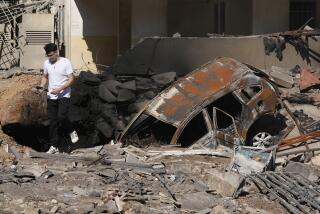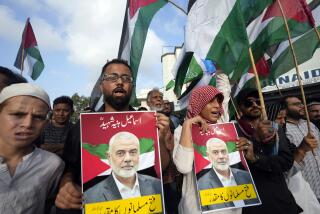Key Al Qaeda figure believed slain in Pakistan
MADRID — A U.S airstrike in northwestern Pakistan is believed to have killed a front-line leader of Al Qaeda, anti-terrorism officials said this week, continuing an aerial barrage that has angered a key American ally but is thought to have hurt the network’s operations.
Intelligence indicates that a missile apparently fired from a U.S. Predator drone killed Khalid Habib, a veteran Egyptian militant who became a leader this year of the “external operations” core based in South Asia but targeting the West, a senior European anti-terrorism official said Thursday.
Habib apparently died in a vehicle that was blown up in the attack Oct. 16 in the village of Saam, a hub of foreign militants protected by tribesmen loyal to a Taliban chief in the South Waziristan region, said the official, who asked to remain anonymous because of the sensitivity of the issue.
As with other Al Qaeda bosses thought to have been slain by U.S. airstrikes in Pakistan this year, confirmation of Habib’s demise remains difficult, and there was conflicting information about the number of casualties in the attack, the official said. But the intelligence seems solid, he said.
“Our working assumption is that he is dead,” the official said.
The slaying of Habib, if confirmed, continues a pattern in which U.S. anti-terrorism forces have set their sights on key second-tier leaders who run day-to-day operations for Osama bin Laden and his top deputy, Ayman Zawahiri, both fugitives. The priority has been to disrupt plotting and training for potential attacks on Western targets, anti-terrorism officials say.
Abu Laith al Libi, a Libyan, is among operational chiefs slain this year. Anti-terrorism officials also believe that a strike in July killed Abu Khabab Masri, an Egyptian explosives expert whose real name was Midhat Mursi al-Sayid Umar and who led Al Qaeda’s efforts to develop chemical weapons. At least 15 suspected Predator strikes have taken place since early August, more than three times the year’s total up until then.
As the pace of the raids has accelerated, the subject has become very delicate for Pakistan’s 7-month-old civilian government. On Wednesday, Pakistani leaders summoned U.S. Ambassador Anne W. Patterson to demand a halt to airstrikes, saying they violated Pakistan’s sovereignty.
Nonetheless, the aerial onslaught appears to have kept the predominantly Arab Al Qaeda core on the run. Residents in North and South Waziristan say militants in recent weeks have avoided mosques and religious schools, which have been prime targets.
Habib’s rise reflected disarray in a depleted leadership, the European official said. Intelligence officials believe the Egyptian shared operational control with bosses identified as Abdullah Said al Libi and Osama al Timi, the official said.
“There were suggestions that Habib had taken over as the head of Al Qaeda military operations,” he said. “But we believe there was a more complicated setup in which he was part of a leadership team. . . . They are having genuine problems replacing some of these top individuals. They are trying out different formulas.”
In 2005, Bin Laden appointed Habib commander of military operations in Afghanistan, said the official and Rohan Gunaratna, a Singapore-based terrorism expert. A close friend of Zawahiri, Habib was considered an “able commander,” but “much less inspiring” than more powerful chiefs who have since been killed or captured, said Gunaratna, who has had access to intelligence and captured militants.
In 2006, Habib played a role in talks with tribesmen in the region to ensure a refuge for Al Qaeda, Gunaratna said. The network operates in the part of South Waziristan where he died, under the protection of Baitullah Mahsud, a prominent Taliban chief, officials say.
In addition to inflicting the high-ranking casualties, U.S. and Pakistani military pressure appears to have slowed Al Qaeda’s propaganda and communications activities on the Internet, the European official said. Anti-terrorism experts are waiting to see whether Bin Laden issues a video before Tuesday’s U.S. presidential election, as he did in 2004.
--
--
Special correspondent Zulfiqar Ali in Peshawar, Pakistan, contributed to this report.
More to Read
Sign up for Essential California
The most important California stories and recommendations in your inbox every morning.
You may occasionally receive promotional content from the Los Angeles Times.










